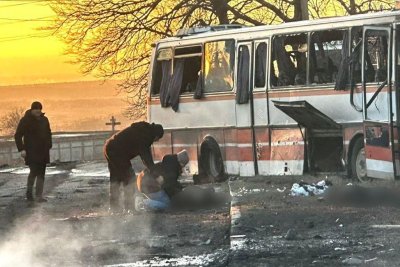Russian drone strike on civilian bus kills 12 miners

Feb. 2 (UPI) — A Russian drone strike in Ukraine’s southeastern Dnipropetrovsk region has killed at least 12 miners and injured eight more, according to officials who are accusing the Kremlin of attacking unarmed civilians.
DTEK Group, Ukraine’s largest private energy company, said a Russian drone struck a bus transporting staff from its Dnipropetrovsk mine, resulting in at least 20 casualties.
“The bus was hit as it was taking miners home after their shift,” the company said in a statement.
The strike was part of a large-scale Russian assault on DTEK’s mining facilities in the region, the company said as it extended its condolences to the families and loved ones of those killed.
Maxim Teimchenko, CEO of DTEK, accused Russia of conducting “an unprovoked terrorist attack on a purely civilian target.”
“This attack marks the single largest loss of life of DTEK employees since russia’s full-scale invasion and is one of the darkest days in our history,” he said.
“Their sacrifice will never be forgotten.”
Serhii Berskresnov, a Ukraine Defense Ministry adviser, identified the weapon used in the attack on Telegram as an Iran-made Shahed drone.
Using a MESH radio modem, the drone pilot deliberately attacked the bus after spotting it on the road, he said.
The drone struck near the bus, with its blast wave forcing the driver to lose control and crash into a fence, he said, adding that as the injured were exiting the vehicle, a second Shahed drone struck.
“The operators operating from the territory of Russia 100% saw and identified the target as civilian, saw they were not military and made a conscious decision to attack,” he said.
“This is yet another act of terrorism. I have no words.”
Russia has been widely accused of committing war crimes in its nearly 3-year-old war in Ukraine. From indiscriminate attacks on civilians to executions, torture and forced deportations, Russia has been repeatedly denounced for alleged war crimes that it denies.
The International Criminal Court has formally opened a war crimes and crimes against humanity investigation into Russia’s invasion of Ukraine and has issued arrest warrants for Russian officials, including its authoritarian president, Vladimir Putin.
The strike was one of numerous Russian attacks across Ukraine on Sunday, with Ukrainian President Volodymyr Zelensky stating on X that people throughout the country were without heat and electricity. Railway infrastructure was hit in the Sumy region, he said.
During the month of January, Russia launched more than 6,000 attack drones, 5,550 guided aerial bombs and 158 missiles at Ukraine, Zelensky said.
“Virtually all of it targeted the energy sector, the railways and our infrastructure — everything that sustains normal life.”
On Saturday, Russia bombed a maternity hospital in Ukraine’s southern city of Zaporizhzhia, injuring six people, according to Prime Minister Yulia Svydenko.
“This is the nature of Russia’s war,” she said.
The attacks occurred during a cold February that has seen the temperatures drop well below freezing, according to the country’s hydrometeorological center.
The strikes come despite U.S. President Donald Trump stating last week that Putin promised him that Russia would refrain from hitting Ukraine for a week.
“I personally asked President Putin not to fire into Kyiv and the various towns for a week, and he agreed to that,” he said during a cabinet meeting without making clear which towns, cities and regions that the Russian leader had agreed not to attack.
“We’re very happy that they did it.”
Trump has been pushing since before he returned to office to end the war, which he vowed to do during his first 24 hours back in the White House.
Zelensky confirmed Sunday that dates for the next trilateral meetings for a cease-fire between the United States and Russia have been set for Wednesday and Thursday in Abu Dhabi.
“Ukraine is ready for a substantive discussion, and we are interested in ensuring that the outcome brings us closer to a real and dignified end to the war,” he said.
